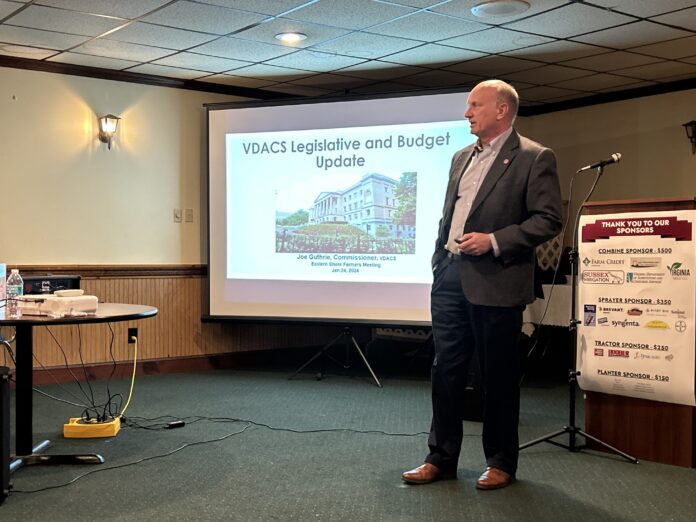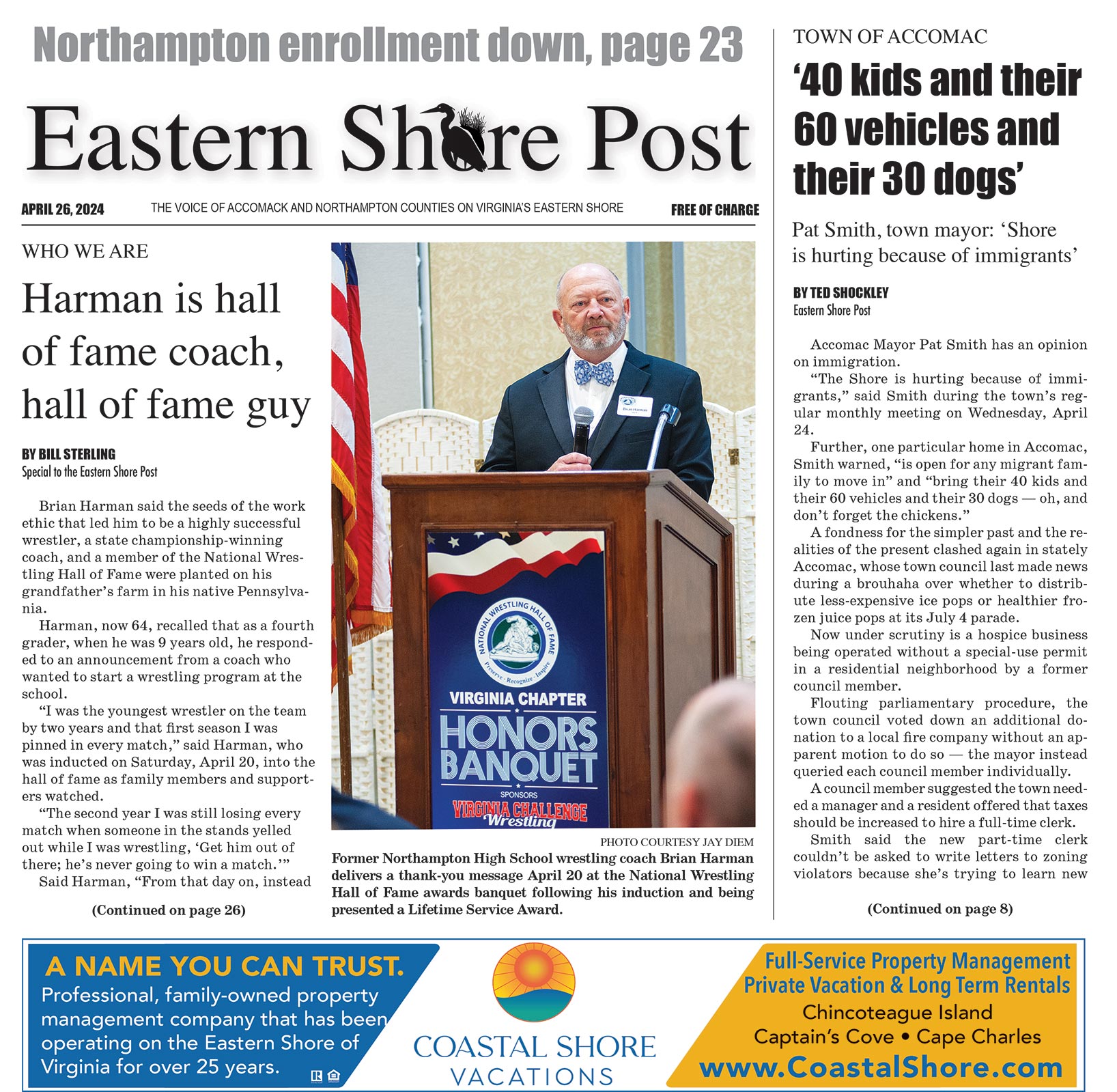
BY CLARA VAUGHN, Eastern Shore Post —
Hundreds of producers from the Shore and beyond gathered at the Exmore Moose Lodge last week for the 34th annual Eastern Shore Agriculture Conference and Trade Show.
“This is our premier agricultural event of the year,” said Accomack County Extension Agent Theresa Pittman, who said up to 200 attended each day of the two-day conference.
The show, which took place Jan. 24-25, has shifted from a potato and vegetable growers’ conference to appeal to a wider range of producers from the Delmarva Peninsula, Pennsylvania, and other areas, she said.
They attended to network with other growers and dozens of agribusiness vendors and to hear forecasts for the year ahead.
Those included a legislative update from Virginia Department of Agriculture Commissioner Joseph Guthrie on Wednesday, Jan. 24.
“Virginia’s No. 1 industry is agriculture,” he said, adding the sector provides over 380 million jobs and $82 billion in economic impact each year.
New legislators
A key issue impacting agricultural laws during this year’s Virginia General Assembly include turnover in the state legislature, which saw major upheaval after redistricting that followed the 2020 U.S. Census.
“We have the biggest turnover in the Virginia General Assembly since the Civil War,” Guthrie said.
“There are 140 members of the General Assembly — 100 in the House of Delegates, 40 in the Senate,” he said. “Fifty-seven of them were not there last year.”
Both the House of Delegates and Senate are now Democrat-controlled, and “that makes a big difference,” Guthrie said.
“A lot of bills that would have died in one of those chambers before now will be able to get through both chambers and land on the governor’s desk.”
Those include a bill that proposes shifting the state’s Office of Farmland Preservation from Department of Agriculture control to the Virginia Department of Forestry, resulting in a new state Office of Working Lands Conservation.
“A lot of properties do combine agriculture and forestry lands, so it makes a lot of sense to combine that into an Office of Working Lands Preservation,“ Guthrie said, adding the move would increase state government’s capacity around conservation easements.
Other proposed bills would change the assessment of soybean checkoff funding to match the national checkoff and increase regulation of large storage tanks, though that bill includes an agricultural exemption, Guthrie said.
Committees overseeing agricultural lawmaking include the Senate Agriculture, Conservation and Natural Resources Committee and House Agriculture, Chesapeake and Natural Resources Committee, and both have a Democrat majority made up of representatives from urban and suburban districts, he said.
State priorities
Among Gov. Glenn Youngkin’s priorities in the ongoing legislative session are meeting Chesapeake Bay clean water goals set by the U.S. Environmental Protection Agency, including a proposed additional $200 million for farm best management practices, Guthrie said.
The governor’s budget also proposes doubling funding for Virginia’s Agriculture and Forestry Industries Development grant program, which incentivizes agriculture and forestry value-added or processing projects, he said.
Virginia aims to boost education programs for companies considering exporting agricultural products and support for local farmers and farmers markets, he said.
Producers in the audience asked about the agricultural exemption for overtime pay, which Guthrie said could require “some sort of compromise” between the Democrat-controlled legislature and a Republican governor.
Key changes
Key changes within the state Department of Agriculture include new regulations and enforcement in the hemp and cannabis industry. The federal Farm Bill only prohibited sale of Delta-9, but new state law allows regulation of Delta-8, for example, Guthrie said.
Virginia also passed a law banning foreign ownership of farmland by “adversarial national governments,” such as China, he said.
The state has launched its Virginia Beer Distribution Company, which should be up and running by the end of 2024 and promote beer in a way similar to how Virginia promotes its wine industry, he said.
The Commonwealth is also working to boost its controlled environmental agriculture sector, allowing farmers to expand the growing season for produce such as strawberries and leafy greens to compete with warmer-weather exporters such as Mexico.
Virginia has a new law to fund processing invasive blue catfish, with the goal of removing them from the Chesapeake Bay and its tributaries, Guthrie said.
Eastern Shore
On the Eastern Shore, Painter’s Agricultural Research and Extension Center could see funds for planning improvements included in this year’s state budget, said Center Director Mark Reiter.
“There’s some exciting possibilities being introduced in the budget for ARECs in general, but particularly here on the Eastern Shore,” he said.
The Virginia Department of Agriculture has a webpage of information for new and beginning farmers at https://www.vdacs.virginia.gov/education-resources-for-new-begining-farmers.shtml
There is an agri-stress helpline that provides 24-7 assistance to farmers at 1-833-897-2474.


